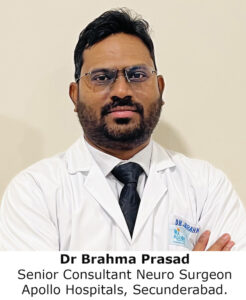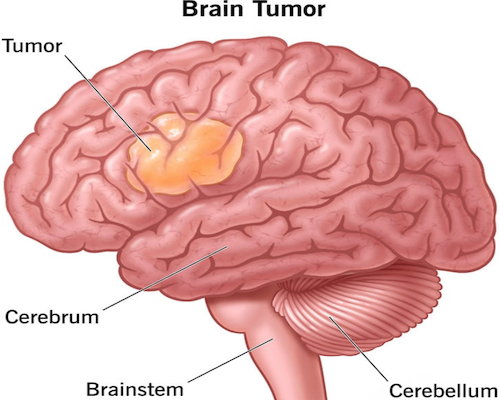World Brain Tumor Day :8th June 2023
India
healthysoch
New Delhi, June 06, 2023:
 Brain Cancer (Brain Tumor)
Brain Cancer (Brain Tumor)
Brain tumors can be malignant (cancerous) or benign (noncancerous) and can affect children and adults. But whether theyʼre cancerous or not, brain tumors can impact your brain function if they grow large enough to press on surrounding tissues. There are several treatment options for brain tumors.
What is a brain tumor?
A brain tumor is an abnormal growth or mass of cells in or around your brain. Together, spinal tumors and brain tumors are called central nervous system tumors. Brain tumors can be malignant (cancerous) or benign (noncancerous). Some tumors grow quickly, while others are slow growing. Only about one-third of brain tumors are cancerous. But whether theyʼre cancerous or not, brain tumors can impact brain function and your health if they grow large enough to press on surrounding nerves, blood vessels and tissue. Tumors that develop in your brain are called primary tumors. Tumors that spread to your brain after forming in a different part of your body are called metastatic tumors.
What are the types of brain tumors?
Researchers have identified more than 150 different brain tumors. Healthcare providers categorize primary tumors as glial (composed of glial cells in your brain) or non-glial (developed on or in the structures of your brain, including nerves, blood vessels and glands) and benign (noncancerous) or malignant (cancerous). Many types of brain tumors can also form in your spinal cord or column.
Usually benign brain tumors
Types of brain tumors that are usually benign include Chordomas, Craniopharyngiomas, Meningiomas, Pituitary tumors and Schwannomas.
Cancerous (malignant) brain tumors
Approximately 78% of cancerous primary brain tumors are gliomas. These tumors develop in glial cells, which surround and assist nerve cells. Types of gliomas include Astrocytomas, Ependymomas, Glioblastomas GBM, Medulloblastomas in children etc
Who do brain tumors affect?
Brain tumors affect children and adults and can develop at any age. Theyʼre slightly more common in males than females. Meningioma, which is usually benign, is the only type of brain tumor thatʼs more common in females. The most serious type of brain tumor is called glioblastoma which is becoming more common among people who are as the general population ages.
How common are primary brain tumors?
Primary brain tumors (tumors that originate in your brain) are uncommon. The International Association of Cancer Registries (IARC) reported that there are over 28,000 cases of brain tumours reported in India each year and more than 24,000 people reportedly die due to brain tumours annually.
How serious are brain tumors?
Brain tumors whether cancerous or not can cause serious problems. This is because your skull is rigid and doesnʼt provide room for the tumor to expand. Also, if a tumor develops near parts of your brain that control vital functions, it may cause symptoms such as: Weakness, Difficulty walking, Problems with balance, Partial or complete loss of vision, Difficulty understanding or using language and Memory issues. Brain tumors can cause problems by: Directly invading and destroying healthy brain tissue, Putting pressure on nearby tissue, Increasing pressure within your skull (intracranial pressure), Causing fluid to build up in your brain, Blocking the normal flow of cerebrospinal fluid (CSF) through the spaces within your brain, causing those spaces to enlarge.
However, some people have brain tumors that never cause symptoms or grow large enough to compress surrounding tissues.
What are the signs and symptoms of brain tumors?
Some people who have a brain tumor experience no symptoms, especially if itʼs very small. Signs and symptoms of a brain tumor vary depending on the tumorʼs location, size and type. They can include: Headaches that may be more severe in the morning or wake you up at night. Seizures. Difficulty thinking, speaking or understanding language. Personality changes. Weakness or paralysis in one part or one side of your body. Balancing problems or dizziness. Vision issues. Hearing issues. Facial numbness, Nausea or Vomiting, Confusion and disorientation. Itʼs important to see your healthcare provider if youʼre experiencing these symptoms.
What causes brain tumors?
Researchers know brain tumors develop when certain genes on the chromosomes of a cell are damaged and no longer function properly, but they arenʼt sure why this happens. Your DNA in your chromosomes tells cells throughout your body what to do when to grow, when to divide or multiply and/or when to die.
When brain cell DNA changes, it gives your brain cells new instructions. Your body develops abnormal brain cells that grow and multiply faster than normal and sometimes live longer than normal. When that happens, the ever-growing crowd of abnormal cells takes over space in your brain. In some cases, a person may be born with changes in one or more of these genes. Environmental factors, such as exposure to large amounts of radiation from X-rays or previous cancer treatment, may then lead to further damage. In other cases, the environmental injury to the genes may be the only cause. Only about 5% to 10% of people with brain tumors have a family history of a brain tumor.
How are brain tumors diagnosed?
Diagnosing a brain tumor can be a complicated process and may involve several specialists. In some cases, though, healthcare providers may discover a brain tumor when performing imaging tests for another medical issue. If youʼre experiencing symptoms of a brain tumor, your healthcare provider will perform a thorough neurological exam and look for any changes that can point to the part of your brain that may be affected and MRI is usually the next step.
What tests will be done to diagnose a brain tumor?
Healthcare providers use several tests to diagnose a brain tumor, including:
Brain MRI or CT scan: Magnetic resonance imaging (MRI) is the best imaging test for identifying brain tumors. Computed tomography (CT) is a good alternative if youʼre unable to undergo an MRI. Biopsy: Neurosurgeon may also need to do a biopsy of the tumor (removal of a sample of the tumor for examination under a microscope) to identify the type of tumor and if itʼs cancerous. Spinal tap: using a small needle to remove cerebrospinal fluid (CSF) from around your spine. A laboratory examines this fluid to look for cancer cells. Specialized tests: tests that check your blood and cerebrospinal fluid for substances that certain tumors release called Tumor markers. They can also test for gene abnormalities that are characteristic of certain tumors.
How are brain tumors treated?
Brain tumor treatment depends on several factors, including: The tumorʼs location, size and type, The number of tumors, Your age & Your overall health.
Benign (noncancerous) brain tumors can usually be successfully removed with surgery and donʼt usually grow back. It often depends on if your neurosurgeon can safely remove all of the tumor. Treatments that are fairly well tolerated by the brains of adults, such as radiation therapy, may prevent the normal development of a childʼs brain, especially in children younger than age five. Healthcare providers often use a combination of therapies to treat a tumor. Your treatment options might include:
Brain surgery: When possible, neurosurgeons remove the tumor. They work very carefully, sometimes performing surgery when youʼre awake (you wonʼt feel pain), to minimize damage to functional areas of your brain.
Radiation therapy: High doses of X-rays destroy brain tumor cells or shrink the tumor in this type of treatment.
Radiosurgery: This is a type of radiation therapy that uses very focused beams of radiation (gamma rays or proton beams) to destroy a tumor. Itʼs not actually surgery because it doesnʼt require an incision (cut).
Brachytherapy: This is a form of radiation therapy. It involves surgically placing radioactive seeds, capsules or other implants directly in or near the cancerous tumor.
Chemotherapy: This therapy consists of anticancer drugs that kill cancer cells in your brain and throughout your body. You might receive chemotherapy through an injection into a vein or take it as a pill. Your healthcare provider may recommend chemotherapy after surgery to kill any cancer cells left behind or to prevent remaining tumor cells from growing.
Immunotherapy: Immunotherapy, also called biological therapy, is a type of treatment that uses your bodyʼs immune system to fight cancer. The therapy mainly consists of stimulating your immune system to help it do its job more effectively.
Targeted therapy: With this treatment, drugs target specific features in cancer cells without harming healthy cells. Your healthcare provider may recommend targeted therapy if you have trouble tolerating the side effects of chemotherapy, such as fatigue and nausea.
Watchful waiting/active surveillance: If you have a brain tumor thatʼs very small and isnʼt causing symptoms, your healthcare provider may recommend closely monitoring the tumor for signs of growth with regular testing. Other treatments that help with symptoms caused by brain tumors include:
Shunts: If the tumor causes pressure within your skull to increase, you may need to have a shunt (a thin piece of tubing) surgically placed in your brain to drain excess cerebrospinal fluid.
Drugs: that can help reduce pressure within your skull. They reduce swelling around the tumor.
Palliative treatment: This is a specialized form of care that provides symptom relief, comfort and support to people living with serious illnesses. It also provides support to caregivers and those impacted by a loved oneʼs condition.
Can brain tumors be prevented?
Unfortunately, you canʼt prevent a brain tumor. You can reduce your risk of developing a brain tumor by avoiding environmental hazards such as smoking and excessive radiation exposure. If you have a first-degree biological relative (sibling or parent) who has been diagnosed with a brain tumor, itʼs important to tell your neurosurgeon. They may recommend genetic counseling to see if you have an inherited genetic syndrome thatʼs associated with brain tumors.
What is the prognosis (outlook) for brain tumors?
The prognosis for people with brain tumors varies greatly. Factors that affect the prognosis include: The tumorʼs type, grade and location. If the whole tumor has been surgically removed. Your age and overall health. In many cases, neurosurgeons can successfully treat a brain tumor. Some people live active and fulfilling lives with brain tumors that donʼt cause symptoms. For some people, brain tumors can recur (return) after treatment. If this happens to you, you may need to continue treatments, including chemotherapy or radiation, to keep the tumor from growing or spreading.
What is the survival rate for brain tumors?
Survival rates are different for each type of brain tumor and vary based on your age, race and overall health. Survival rates are estimates based on averages. The five-year survival rates for meningioma, the most common type of benign (noncancerous) primary brain tumor, are: Over 96% for children ages 14 and under. 97% in people ages 15 to 39. Over 87% in adults 40 and older.
Talk with your Neurosurgeon about what to expect with your diagnosis.
When should I see my Neurosurgeon about my brain tumor?
If youʼve been diagnosed with a brain tumor, youʼll need to see your healthcare team regularly to receive treatment and monitor your symptoms, especially if they get worse or develop new symptoms. Even after brain tumor treatment, you should follow up with your neurosurgeon regularly.
Learning you have a tumor in your brain can be scary and stressful. Not all brain tumors are cancerous though. In fact, about two-thirds of them are benign. However, they can still cause problems for your brain. Know that your healthcare team will develop an individualized and thorough treatment plan to help treat the tumor and improve your quality of life.
Author: Dr Brahma Prasad, Senior Consultant Neuro Surgeon, Apollo Hospitals, Secunderabad.







